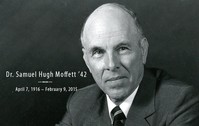Samuel Hugh Moffett (April 7, 1916-February 9, 2015) passed peacefully at his home in Princeton, NJ, on February 9, 2015, with Eileen Flower by his side, after a long life of loving kindness, faithfulness, and unwavering hope in his missionary service and scholarly works.
He was born in Pyongyang, Korea, on April 7, 1916, as the third son of Rev. Dr. Samuel Austin Moffett (1864-1939). His father was the founder of the Presbyterian Church in Pyongyang and Northwestern Korea and the leader of one of the largest mission stations in the world for 40 years. His mother Lucia Fish Moffett (1877-1962) was from the well-known family of that name in Carpentaria, CA. He had two older brothers – US pastor James McKee served churches in New Jersey, Pennsylvania, and New York (1905-1986), and Charles Hull (1908-1976) became a missionary to India from 1945 to 1952 and then served churches in the US like pastor James McKee (correction noted from family members), two younger brothers—Howard Fergus (1917-2013) served Korea as a medical missionary from 1948 to 1992 and Thomas Fish. Once he said, “She [my mother] brought me up on the classics, and my father brought me up on the Westminster Catechism.”
He graduated from Pyongyang Foreign School as valedictorian in 1934 and Wheaton College with summa cum laude in 1938. He graduated from Princeton Theological Seminary in 1942 and married Miss Elizabeth B. Tarrant in July 1942. Moffett received Ph. D. in history at Yale University in 1945, on the relations of the Presbyterian mission board with its work in the Shandong station in China. Professor Kenneth Scott Latourette was his PhD mentor.
Moffett followed in his parents footsteps in spiritual life, missionary service, and teacher’s work. In 1947 he and his wife were appointed by the Presbyterian board as missionaries to Shanghai, China. When the civil war was going on, he served as a faculty member of Yenjing University in Beijing and then of Nanking Theological Seminary until forced out of the country in 1951 by the communists. He returned to Princeton Theological Seminary as a faculty member from 1953 to 1955. Yet his wife Elizabeth died in 1955, after which he returned to the land of his birth—Korea--in November 1955. He remarried with Miss Eileen Flower in September 1956. They started their missionary work in the rural area of Andong and learned Korean culture and language there for three years. He was appointed to a faculty of Presbyterian Theological Seminary in 1959. Until 1981 he served as Dean of the graduate school and co-president of Korean Presbyterian Seminary. He also participated in many ecumenical organizations such as Soongsil University, Yonsei University, and Korea Bible Society as a member of board of directors or a committee member. He also served as the first director of the Asian Center for Theological Studies, which was built for the education of Asian church leaders in 1973.
After 26 years work in Korea, he returning to America and was appointed as Henry Luce Professor of Ecumenics and Mission at Princeton Theological Seminary for five years, retiring in 1986. Since retiring, he published the first volume on the History of Christianity in Asia in 1996. He published this second volume in 2005, thirteen years after the publishing of the first, at the age of 89.
He was a leading scholar on the history of Christianity in East Asia and in the global ecumenical movement. He was the author of numerous publications, including Whe'er the Sun (1953), The Christians of Korea (1962), The Biblical Background of Evangelicalism (1968), and his magnum opus two volumes of A History of Christianity in Asia.

